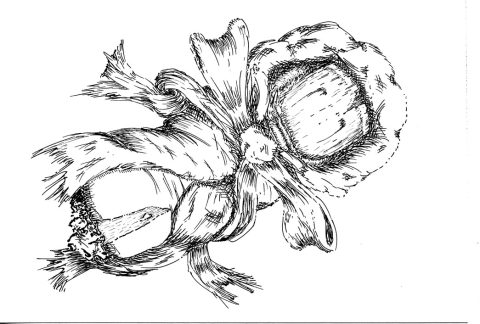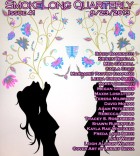When I first read this story, the last line immediately sent me back up to the first line, and I felt compelled to read the story again. Also, not a word is wasted in this flash fiction, which impresses me to no end. Can you write a bit about how this story came about?
When I was about twelve, my dad handed me a copy of The Complete Sherlock Holmes and said, “Here, read this.” I’m not sure he expected to spend most of my teenaged years taking me to Sherlock Holmes Appreciation Society meetings! It was the beginning of a love affair with the nineteenth century, including a PhD on the unjustly neglected novelist Mona Caird.
Oddly, perhaps, I don’t write very much fiction set in that period. I suspect this is because I’ve read so much, not only the established classics but what scholar Sally Mitchell refers to as “bucketfuls of forgettable novels” (the popular fiction of its day). I’m hyperaware of Getting It Wrong And Sounding Generically Victorian. Dialogue in particular is something I’m wary of, which—I’ve just noticed—could explain why “The Toy” has none.
After my PhD, I submitted several flash fiction pieces for a Cubicle 7 role-playing game, Victoriana. When your shared universe is rooted in steampunk and the supernatural, you can be a little less concerned about historical reality, and I had a lot of fun writing these. One was an early version of “The Toy,” and when I reread it a few years later, I thought it deserved to be expanded from its sub-200 word count and fleshed out.
I really appreciate your 19th century take in this flash! It reminds me of Stephen Crane’s Maggie: A Girl of the Streets. The bleak prospect of Nelly going either Lizzy’s way or Sal’s way affects me much the way Crane’s Maggie does. Mam, though, is my favorite character. So, which character grew the most when you expanded this into a flash fiction?
Thanks very much!
In the original, Sal and Lizzy were much vaguer as characters; the gentleman shouts at Lizzy but you don’t see her piling her hair or going out, so the reader is basically depending on being told what she’s up to rather than being given details which they can interpret for themselves. Mam also grew—the bit of indirect dialogue, the hint that she drives a hard bargain even in these conditions, and her instructions to Jamie at the end of the story were all added.
The expansion also gives the characters more interaction with each other, which shows that they are a family, albeit a somewhat dysfunctional one!
What is a typical writing day like for Tracey S. Rosenberg?
No such thing as a typical day! Ideally I have a long stretch so I can get stuck in, but it’s tough to get past the distractions—mainly, the Internet and my patched-together paid employment (which, thankfully, tends to be pretty flexible).
If I’m really on the ball, I’ll edit/polish the rough drafts I’m working on at the moment—usually poems, though recently I’ve been working on science fiction stories as well. If I’m working on a longer fiction project, I’ll try to edit at least one chapter.
I also pay attention to submissions and markets, and at least a few times a week I’ll check the WebPages of places where I’ve already submitted. Many competitions won’t inform you if you’re unsuccessful, so if I can find that out for myself, it frees up the story or poem for a new market.
I’m really grateful to have a laptop, which means I can theoretically write anywhere. This doesn’t always happen, but at least I have little excuse not to!
You mentioned a PhD earlier. Do you teach? Or are you planning on teaching writing workshops in the future?
I’m actually stuck in a very annoying situation— I have a PhD and a lot of teaching experience in English literature, and a publication history in creative writing which includes a historical novel, a poetry pamphlet, and many poems/short stories, but even though I get interviews for creative writing positions, I keep not being hired—and the feedback always centers around my not having enough creative writing teaching experience within an academic setting.
So I’ll keep doing community workshops, some of them through the amazing Edinburgh grassroots literary collective, Inky Fingers , and writing and publishing, and hopefully eventually someone will give me a hand up the ladder. Fingers crossed!
Finally, you mentioned Sir Arthur Conan Doyle before. What other writers inspire, influence, and make you grateful that they put their words down on paper?
I love Persephone Books, reprints of forgotten novels (mostly by women). Dorothy Whipple’s High Wages had me cheering for the heroine, a clever shopgirl who works her way up to become a businesswoman. There’s plenty of romance, but love isn’t the only important part of her life — money and autonomy and self-respect are also essential. Sometimes, when I despair that I will ever be remembered, I think that maybe perhaps someone will dig up my writing and reprint it in a tastefully designed edition with a matching bookmark.
Since my daily commute is over an hour on foot, I’ve been listening to audio books, which allowed me to revisit Walter M. Miller’s A Canticle for Leibowitz, an amazing atomic era novel (well, technically, three linked pieces of fiction). He had an amazing ability to focus on a few key moments in the life of a post-nuclear holocaust monastic order while reflecting the patterns a huge sweep of history. I’ve recently started writing science fiction again, so this was a great reminder of how it’s possible to write about individuals while never losing sight of the social, historical, and scientific context that they live in and react to.
Finally, Jennifer Egan’s A Visit from the Goon Squad entertained me through a large section of a plane trip from western Europe to South America. I loved how each story had its own voice, yet they all meshed into a cohesive narrative.
Many thanks for interviewing me!



 The core workshop of SmokeLong Fitness is all in writing, so you can take part from anywhere at anytime. We are excited about creating a supportive, consistent and structured environment for flash writers to work on their craft in a community. We are thrilled and proud to say that our workshop participants have won, placed, or been listed in every major flash competition. Community works.
The core workshop of SmokeLong Fitness is all in writing, so you can take part from anywhere at anytime. We are excited about creating a supportive, consistent and structured environment for flash writers to work on their craft in a community. We are thrilled and proud to say that our workshop participants have won, placed, or been listed in every major flash competition. Community works.